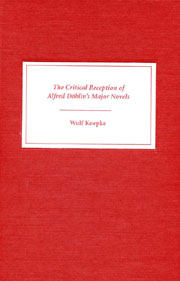Book contents
- Frontmatter
- Contents
- Preface
- Major Novels by Alfred Döblin
- Introduction
- Part One Contemporary Reviews
- Part Two Döblin Scholarship
- 3 Döblin Scholarship: The First Approaches
- 4 Die drei Sprünge des Wang-lun
- 5 Wadzeks Kampf mit der Dampfturbine
- 6 Wallenstein
- 7 Berge Meere und Giganten
- 8 Manas
- 9 Berlin Alexanderplatz
- 10 Babylonische Wandrung
- 11 Pardon wird nicht gegeben
- 12 Amazonas
- 13 November 1918
- 14 Hamlet oder Die lange Nacht nimmt ein Ende
- 15 Döblin's Impact on Other Writers
- Conclusion
- Bibliography
- Index
9 - Berlin Alexanderplatz
from Part Two - Döblin Scholarship
Published online by Cambridge University Press: 05 February 2013
- Frontmatter
- Contents
- Preface
- Major Novels by Alfred Döblin
- Introduction
- Part One Contemporary Reviews
- Part Two Döblin Scholarship
- 3 Döblin Scholarship: The First Approaches
- 4 Die drei Sprünge des Wang-lun
- 5 Wadzeks Kampf mit der Dampfturbine
- 6 Wallenstein
- 7 Berge Meere und Giganten
- 8 Manas
- 9 Berlin Alexanderplatz
- 10 Babylonische Wandrung
- 11 Pardon wird nicht gegeben
- 12 Amazonas
- 13 November 1918
- 14 Hamlet oder Die lange Nacht nimmt ein Ende
- 15 Döblin's Impact on Other Writers
- Conclusion
- Bibliography
- Index
Summary
The Resounding Success
THE YEAR BEFORE DÖBLIN PUBLISHED Berlin Alexanderplatz in 1929, he had been honored widely for his fiftieth birthday, and he was a dominant figure in the Berlin cultural scene, but his publications remained texts for other writers, critics, and the happy few. The public at large knew the man but not his work. Furthermore, his stormy relations with his publisher Samuel Fischer had reached the point of crisis. It was only after much hesitation that Fischer consented to publish one more book by the quarrelsome author who brought in little or no money. Fischer disliked the title Berlin Alexanderplatz and insisted on adding the subtitle Die Geschichte vom Franz Biberkopf. But then the unforeseen happened: the book sold more copies in the first weeks than all Döblin's previous books combined. Berlin Alexanderplatz became one of the bestsellers of the last years of the Weimar Republic, together with other assorted novels, including Erich Maria Remarque's Im Westen nichts Neues, Hans Fallada's Kleiner Mann, was nun?, Hans Grimm's Volk ohne Raum, Edwin Erich Dwinger's Die Armee hinter Stacheldraht, most of them war and anti-war novels. The success of Döblin's novel is all the more surprising because of his modernist style, and can only be explained by the attraction of the topic, the Berlin underworld, which found its classic depiction in Fritz Lang's film M. Berlin Alexanderplatz has been designated as a big-city novel, and as the German equivalent of John Dos Passos's Manhattan Transfer and James Joyce's Ulysses.
- Type
- Chapter
- Information
- The Critical Reception of Alfred Döblin's Major Novels , pp. 126 - 157Publisher: Boydell & BrewerPrint publication year: 2003

